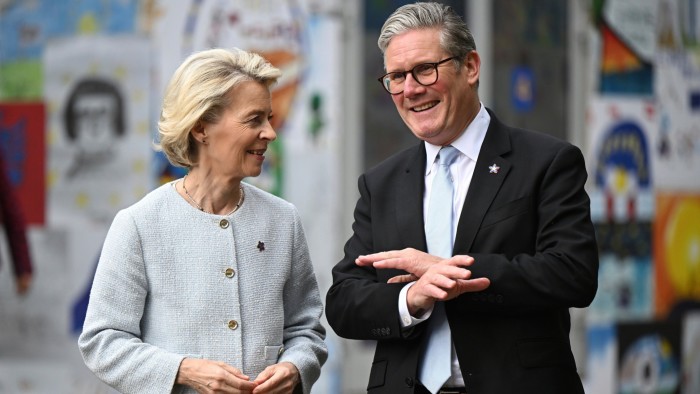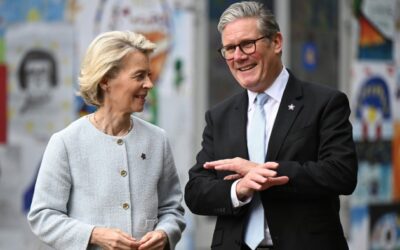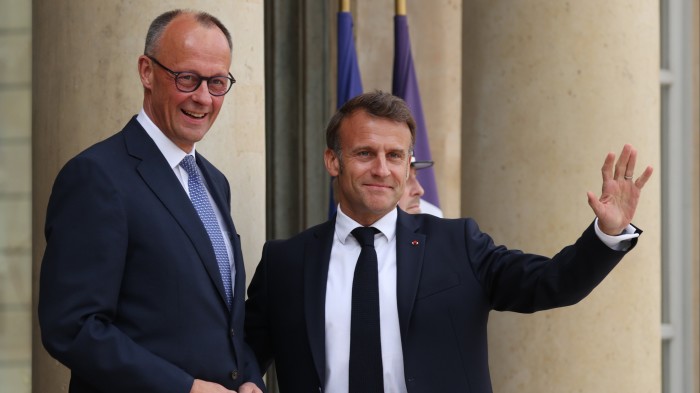UK and EU agree post-Brexit reset after ‘breakthrough’ in talks

The UK and EU have agreed a historic post-Brexit reset of relations after a “late breakthrough” in overnight talks ahead of a summit in London on Monday, officials on both sides said.
Britain agreed to open its fishing waters for 12 more years to EU boats — a move that will be condemned by the opposition Conservatives — according to Brussels officials. The UK had previously offered five years.
In return, UK Prime Minister Sir Keir Starmer secured a veterinary deal that will remove much red tape for British farming and fisheries exports to its biggest market, in a much-sought economic prize of the “reset” talks.
Three EU diplomats confirmed Brussels had dropped demands to link the duration of the agrifood deal to the one for fish, while British officials confirmed that a deal on the two issues had been done.
Both sides were locked in intense haggling through the night over key details of their revamped relationship, including on fisheries and food trade, along with wording about a proposed youth mobility scheme.
Starmer has argued that the two sides should carry on talking about the proposed youth scheme — including the possibility of Britain returning to the Erasmus student exchange programme — rather than make concrete commitments at the London summit.
EU diplomats said the final text said that the two sides would “work towards” a deal on improved youth mobility, heralding months of negotiations. They said it was a disappointing outcome but acknowledged that Starmer was under huge domestic pressure on migration.
“There was a late breakthrough last night,” one British official said. Ambassadors from the 27 member states met early on Monday to sign off on the package, even as leaders of the EU institutions headed for London to formally agree it.
The eleventh-hour talks came ahead of a summit at London’s Lancaster House on Monday morning, when both sides will sign a security and defence partnership, the centrepiece of the new relationship.
The EU offered Britain a new open-ended deal to lower barriers to trade in agrifood products, but only in exchange for a rollover into the 2030s of a current deal allowing EU fishermen to operate in UK waters.
Fishing groups in the UK fear the arrangement risks becoming permanent and opposition Conservative politicians and the Eurosceptic press are already claiming that the sector is about to be sold out.
Downing Street declined to comment on the offer. The summit is due to start on Monday at 10am UK time.
Starmer is scheduled to sign the defence pact and a communiqué promising deeper economic co-operation during a two-hour meeting with European Commission president Ursula von der Leyen and European Council president António Costa.
The EU-UK summit, the first since Brexit took effect in 2020, is expected to emphasise a spirit of reconciliation, but the tense talks in Brussels on Sunday were a reminder that the relationship is now highly transactional.
Details of the EU-UK deal are highly politically sensitive. Conservative leader Kemi Badenoch has warned that Starmer is about to “surrender” British interests.
British officials acknowledged the EU would not agree to an open-ended deal to remove post-Brexit barriers to trade in food and animals — one of the biggest “asks” of the UK — unless Brussels was happy with a deal on fish.
“We want to give confidence to business,” said one UK official, admitting that a time-limited veterinary deal — known as a sanitary and phytosanitary agreement — would leave too much uncertainty for farmers and supermarkets.
Britain has also conceded that removing barriers to trade in foodstuffs will require the UK to “dynamically align” with rules made in Brussels — staying in step with EU regulations as they change — and also make payments to the EU to fund work on food and animal standards. Conservatives claim this is a “betrayal” of Brexit.
The EU also demanded an ambitious youth mobility scheme — including better access for students to UK universities — in a communiqué to be issued alongside the defence pact.
The EU warned Starmer it would not make it easier for British touring musicians to travel across national borders in Europe or for UK travellers to use passport e-gates unless he was bolder on youth mobility, according to officials briefed on the talks.
Starmer has said a youth mobility scheme will happen, but wanted to keep the language in the communiqué vague, allowing detailed talks about controversial areas such as numbers and student fees for further negotiations later this year.
Details of the final text are due to be published at midday on Monday, but Starmer and his EU interlocutors will be at pain to stress areas of agreement, rather than tensions exposed by the painful last-minute talks.







